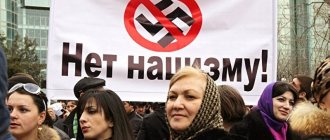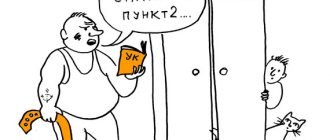The Federation Council has prepared amendments to Federal Law 114 “On Combating Extremist Activities.”
Article on the topic Ideological justice. Should you be jailed for genocide denial?
They want to expand the concept of “extremism” to include the justification of fascism. The text of the document uses the term “rehabilitation of Nazism.”
Earlier, representatives of the State Duma came up with a similar initiative. The fundamental difference of the new bill is that it proposes not to create a new article in the Criminal Code, but to expand the existing one.
What is Nazism?
The bill provides the following definitions:
Nazism is a totalitarian ideology (doctrine) and the practice of its application by Hitler’s Germany, its allies and satellites in the period from 1933 to 1945, associated with totalitarian terrorist methods of power, the official gradation of all nations according to the degree of usefulness, propaganda of the superiority of some nations over others, accompanied by crimes against peace, war crimes, crimes against humanity, genocide, recognized as such by the International Military Tribunal for the Trial and Punishment of the Main War Criminals of the European Axis Countries (hereinafter referred to as the International Military Tribunal *);
Nazi criminals - leaders, organizers, instigators, accomplices and perpetrators of war crimes and crimes against peace and humanity, subject to the jurisdiction of the International Military Tribunal;
Nazi collaborators are executors of criminal orders of the Nazi regime, the military command of the Wehrmacht, SS soldiers, auxiliary police, as well as other persons who deliberately contributed to the execution of criminal orders of Nazi criminals, subject to the jurisdiction of national, military or occupation tribunals based on the verdict of the International Military Tribunal.
Article on the topic
Expert: NATO now has a new target in the form of an aggressive Russian bear
Is it true that only real Aryans with impeccable pedigree and blond hair were accepted there?
There are two points here. At first membership was voluntary. And along with the application to join the ranks of the Waffen SS, it was indeed required to provide documents of origin. Of course, there was selection based on health. In addition, they accepted men who had no criminal record. As for height, age and appearance, you can find rather contradictory information. One thing is clear - the specific criteria depended on the year of admission and the unit.
SS recruits take the oath of office in the presence of senior party officials on September 19, 1940
Since 1943, due to personnel shortages, the Waffen SS began recruiting by conscription. That is, a young man of military age did not have the opportunity to choose where he wanted to serve - in the Wehrmacht or in the Waffen SS. All additional requirements have been removed.
What actions will be considered rehabilitation of Nazism?
- restoration of the rights of Nazi criminals and their accomplices;
- public justification of the ideology and practice of Nazism, recognition of them as correct, in need of support and imitation;
- public dissemination of Nazi ideology;
- public approval of crimes against peace, war crimes and crimes against humanity established by the verdict of the International Military Tribunal*;
- glorification of Nazi criminals and their accomplices, namely:
- conferring state or public awards;
- assigning names of Nazi criminals and collaborators to streets and squares, populated areas and other geographical objects;
- establishing holiday dates in their honor;
- public glorification of Nazi criminals and their collaborators and their crimes.
What is extremism?
Extremist activities (extremism) include:
Article on the topic
Criminal liability for the rehabilitation of Nazism is necessary - experts
- violent change in the foundations of the constitutional system and violation of the integrity of the Russian Federation;
- public justification of terrorism and other terrorist activities;
- inciting social, racial, national or religious hatred;
- propaganda of exclusivity, superiority or inferiority of a person on the basis of his social, racial, national, religious or linguistic affiliation or attitude to religion;
- violation of the rights, freedoms and legitimate interests of a person and citizen, depending on his social, racial, national, religious or linguistic affiliation or attitude to religion;
- obstruction of citizens' exercise of their voting rights and the right to participate in a referendum or violation of the secrecy of voting, combined with violence or the threat of its use;
- obstruction of the legitimate activities of state bodies, local governments, election commissions, public and religious associations or other organizations, combined with violence or the threat of its use;
- propaganda and public display of Nazi paraphernalia or symbols, or paraphernalia or symbols that are confusingly similar to Nazi ones;
- public calls for the implementation of these acts or mass distribution of obviously extremist materials, as well as their production or storage for the purpose of mass distribution;
- publicly knowingly falsely accusing a person holding a public office of committing extremist acts during the performance of his official duties;
- organization and preparation of these acts, as well as incitement to their implementation;
- financing of these actions or other assistance in their organization, preparation and implementation, including through the provision of educational, printing and material and technical base, telephone and other types of communications or the provision of information services.
That is, not only Germans served in the Waffen SS?
Yes. But not at once.
The first three formations, which later became tank divisions (Leibstandarte, Reich and Death's Head), were initially staffed exclusively by Reichsdeutschmen. Until 1943, certain selection criteria were in effect for them. The 4th Division (“Polizei”), with its own special history, was recruited from Germans without additional requirements.
However, the further, the more massively the SS divisions included Volksdeutsch and foreigners. And in the “old” divisions, the selection criteria were gradually blurred. And inconspicuous nuances began to appear in the names of the new divisions. The divisions, the formation of which began in 1942–1943 away from Germany, were often not SS Divisionen (SS divisions), but Divisionen (bei) der SS (divisions under the SS).
Veterans of Galicia, Skanderbeg, Khanjar, as well as the 15th and 19th Latvian and 20th Estonian divisions are still mistaken if they believe that they served in the SS.
They served under the SS. Although it should be noted that the distinction was not always observed.
The 36th Division stood apart from the general background, which crawled to the size of a division only on paper. Initially, it was not a Waffen, but a Sonder (special) and was staffed by criminals. They did not set themselves the task of fighting, but torturing civilians and guerrillas who did not escape - this was precisely their profile. Any criminals were accepted into the ranks of the division, without discrimination based on nationality.
What materials will be checked for rehabilitation of Nazism?
The law introduces the concept of state anti-Nazi expertise. The procedure for carrying it out has not yet been approved. It is only known that the examination will be mandatory:
- constituent documents of public and religious associations, other non-profit organizations, mass media;
- content of basic educational programs, state standards in the field of education.
In addition, regardless of the conduct of the state examination, the law provides for the conduct of a public examination. It will be carried out to check for signs of rehabilitation of Nazism in the texts:
- laws on the perpetuation of memory, conferring honorary titles or state awards to veterans and victims of the Great Patriotic War;
- results of scientific, literary and creative activities;
- materials from printed and electronic media;
- advertising;
- propaganda materials;
- decisions on awarding public awards to participants, veterans and victims of the Great Patriotic War.
The procedure for conducting a public examination has also not yet been approved.
Example of decisions made
From the outside it may seem that the punishment for an offense is large. In fact, in judicial practice there are many cases where the main offense included several articles at once.
Example #1: a real case in 2021. The Crimean citizen was immediately charged with the following articles:
- 1 – slander and dissemination of deliberately false information that discredits the honor and dignity of third parties.
- 137 – dissemination of information about private life.
- 6 – fraud in the field of computer technology.
- 354 – rehabilitation of Nazism.
According to the collected articles, the citizen not only offended a certain group, she used deliberately false information to defame her honor, and also used her position to spread the information. Lawyers comment that Article 354 is rarely used as a single charge.
Example No. 2: the newspaper published an article in which the situation in World War II was interpreted in its own way, while the government was exposed as a manipulator and the creator of a false idea of history.
In this case, in addition to false information and the intention to misinform people who read the newspaper, the journalist also uses his position. The punishment will be tougher.
Who will be able to conduct a public examination?
The following may initiate a public anti-Nazi examination:
- Public Chamber of the Russian Federation, constituent entities of the Russian Federation, municipalities;
- public councils under federal executive authorities;
- citizens of Russia;
- public associations;
- non-profit public organizations.
The conclusion of the public examination will be sent to government agencies, which will have to conduct an audit of the facts specified in it.
They say they were all neo-pagans, obsessed with the occult?
Reichsführer SS Heinrich Himmler was obsessed with the occult. He loved to invent various rituals, revive ancient traditions and fight Christianity. The result was often “fantasy”.
Due to natural inconsistency, he was unable to bring any of his undertakings to anything. Therefore, it seems that some (but not all) Waffen SS units wore runes in their buttonholes, but the meaning of the squiggles was not clear to everyone. If before 1940 there were special classes with personnel at which runic wisdom was explained, then after 1940 theoretical training came to naught. Of course, there were no pagan priests in the SS troops, but, unlike the Wehrmacht, there were no chaplains either. Instead there were dentists.
How will they punish for the rehabilitation of Nazism?
The rehabilitation of Nazism falls under the existing Article 280 of the Criminal Code of the Russian Federation, according to which public calls for extremist activities are punished:
- a fine in the amount of 100,000 to 300,000 rubles;
- a fine in the amount of wages or other income of the convicted person for a period of one to two years;
- forced labor for up to three years;
- arrest for a term of four to six months;
- imprisonment for a term of up to four years with deprivation of the right to hold certain positions or engage in certain activities for the same period.
The same acts committed using the media are punishable by:
Article on the topic
The Third Reich was defeated 67 years ago. Why does fascism still not disappear?
- forced labor for a term of up to five years with or without deprivation of the right to hold certain positions or engage in certain activities for a term of up to three years;
- imprisonment for a term of up to five years with deprivation of the right to hold certain positions or engage in certain activities for a term of up to three years.
In accordance with Article 282 of the Criminal Code of the Russian Federation, incitement to hatred or enmity, as well as humiliation of human dignity on the grounds of gender, race, nationality, language, origin, attitude to religion, membership in any social group, committed publicly or using the media , are punished:
- a fine in the amount of 100,000 to 300,000 rubles;
- a fine in the amount of wages or other income of the convicted person for a period of one to two years;
- deprivation of the right to hold certain positions or engage in certain activities for a period of up to three years;
- compulsory labor for a period of up to 360 hours, or correctional labor for a period of up to one year;
- forced labor for up to four years;
- or imprisonment for a term of up to four years.
Innovations in 2021
In 2021, Putin announced that the sentence for insulting veterans or society associated with Nazism would be tightened. The maximum period for innovations will be 5 years. The tightening will apply to all forms of disrespect or provision of deliberately false information.
The changes will also affect the size of fines. If their maximum value previously was about 300 thousand rubles, then according to the updated bill - up to 3 million rubles. The period for which the prisoner will be able to pay his wages is 3 years.
The period of forced labor will increase. It will be about 3 years. The tightening is due to the increasing number of cases where offenses under Article 354 occur.
What is not covered by the bill?
The draft specifically stipulates that its effect does not apply to scientific, literary, artistic and other creative activities that do not pursue the rehabilitation of Nazism or the glorification of Nazi criminals and their accomplices.
*An international tribunal is an international body created to try criminals and states on charges of committing international crimes. The international trial of the former leaders of Nazi Germany took place from November 20, 1945 to October 1, 1946 at the International Military Tribunal in Nuremberg (Germany). The Tribunal found the SS, SD, Gestapo and the leadership of the Nazi Party criminal.
Main problems of the law
The document was subject to significant criticism from deputies and the public. Many of them noted that such a law could significantly impact media freedom, thereby suppressing critical speech on historical issues.
Some experts believe that the article requires a significant number of edits because it does not indicate scientific activities studying the history of World War II and the participation of the USSR in it. As an example, we can cite a historian who does not have the right to discuss the activities of the USSR during the Patriotic War using critical expressions.
Thus, the grandson of Joseph Stalin, Evgeny Dzhugashvili, wrote a statement against Professor David Felman, who in one of his broadcasts blamed the NKVD for the execution of the Polish army in the spring of 1940. Formally, this is considered a denial of the facts, not to mention the fact that professors and researchers have different assessments of memorable dates associated with the defense of the Fatherland. The case was never brought, but it became a wake-up call for historians.
Even more questions arise regarding the formulation of the disposition. Why is it impossible to spread false information about the activities of the USSR only in connection with the Second World War? It follows from this that it is still possible to disseminate false information if it does not relate specifically to the Patriotic War. We should not forget about the declassification of archives, which has been delayed for several decades.
The explanatory note to Article 354.1 of the Criminal Code states that the objective side of the law does not include scientific activities to study the history of the Second World War. However, what is important is that the explanatory note is itself a source of law.
Important! The ban on scientific activities is a violation of the Constitution of the Russian Federation.
In addition, it is not clear how the issue with Article 13 of the Constitution of the Russian Federation, which recognizes ideological diversity, will be resolved. The legal practitioner faces the challenge of defining rehabilitation of Nazism and explaining how it differs from expressing one's thoughts and ideals.
How will government officials determine the accurate publication of extracts from the speeches of lawyers and the defendants themselves? After all, quoting in this case is also Nazi propaganda. There are many questions about this bill. In particular, what will happen to the countries that organized the International Military Tribunal if there has been no agreement between them for a long time?
Due to the fact that insulting symbols of military glory is identified as an offense, taking into account the priorities of the state, it is unknown what specific liability for such an act should be - criminal or administrative. The lack of legal regulation of the most important and less important symbols of the Second World War also contributes to the uncertainty.
Taking into account the general problems, the following conclusion is: the article will become viable if it is finalized at the legislative level and gains some exceptions in the form of scientific discussion and judicial investigation materials.









